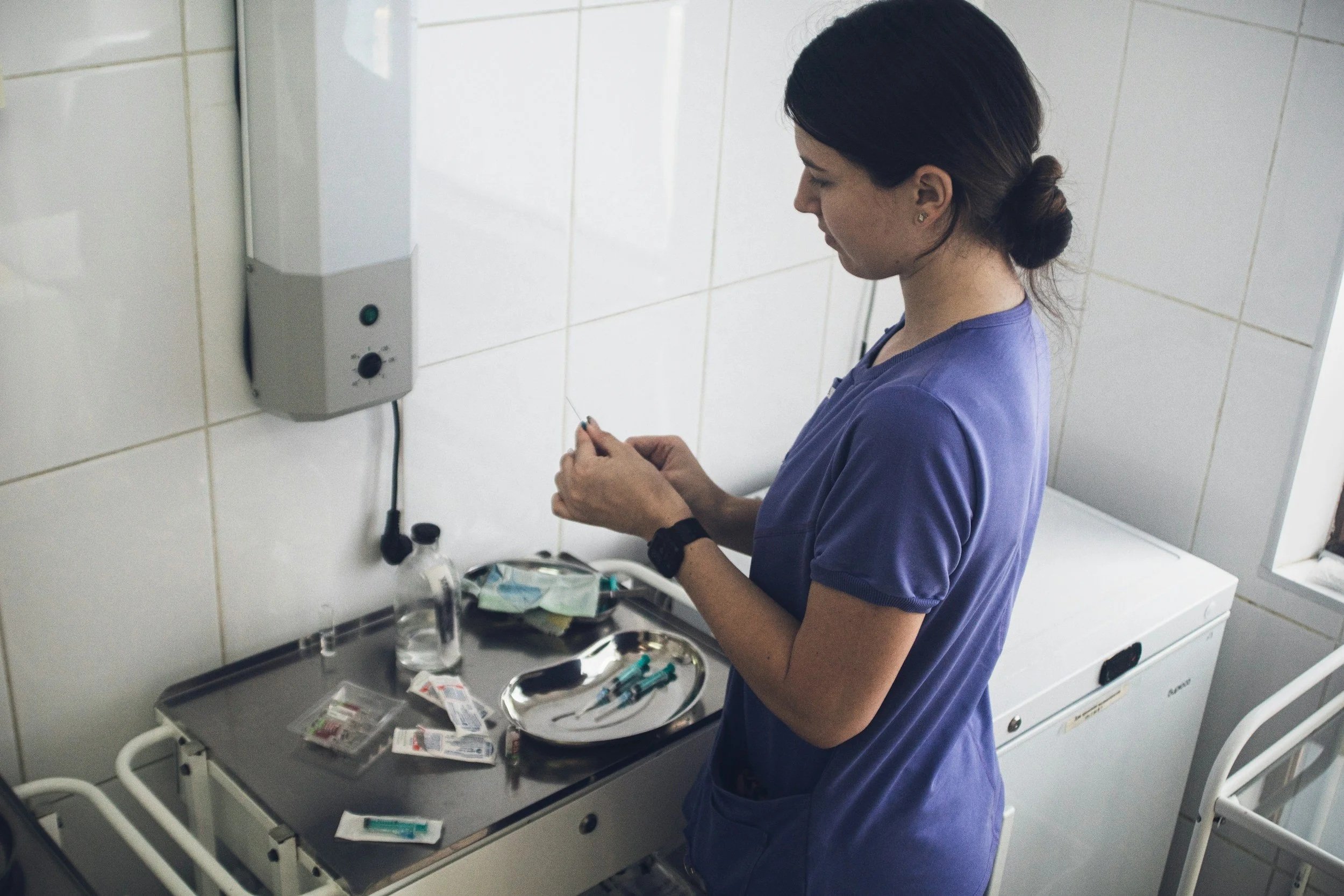In any given month, most women grow and develop one egg, contained within a small fluid filled sac known as an ovarian follicle. This one egg is “selected” from a cohort of eggs, resting in a group of small follicles within the ovary. Women undergoing the egg freezing process are stimulated so that more than one egg grows, matures, and can be successfully retrieved and frozen. Such stimulation can be accomplished in different ways.

With minimal stimulation egg freezing, you may not have to give yourself injections at all.
Conventional Egg Freezing
Traditionally, women are given relatively high doses of medications called “gonadotropins,” which are actually copies of hormones naturally produced by the pituitary gland. When given at supraphysiologic doses (higher amounts than found naturally), these drugs cause multiple follicles to develop, each containing an egg. For most women freezing their eggs, this conventional method is best, as it produces the most eggs that can be retrieved and frozen. However, conventional stimulation also has the highest chance of significant side effects. While most women tolerate the medications well and have only mild side effects (minimal bloating and discomfort), some women have significant side effects (pain, bloating, dehydration) and cannot tolerate this treatment. Furthermore, although now very rare, some women can develop a condition known as Ovarian Hyperstimulation Syndrome (OHSS), with severe pain and dehydration, sometimes requiring hospital admission.

Women who choose minimal stimulation egg freezing take lower doses of hormone injections compared to conventional egg freezers, or take pills only.
Minimal Stimulation Egg Freezing
Alternatively, women can undergo “minimal stimulation” (or “min stim”) by taking pills, such as Clomid or Letrozole, or very low doses of gonadotropins. These medications also cause multiple follicles to develop, yet usually fewer than with conventional stimulation. There are two main groups of patients that should choose this alternative route.
Patients that have previously taken high doses of gonadotropins and experienced severe side effect or OHSS: Using minimal stimulation, the risk of these complications is nearly zero.
Patients that have taken high doses of gonadotropins and developed only a small number of follicles: These patients typically respond equally well with minimal stimulation as with conventional stimulation, which are expensive and require daily injections.

With minimal stimulation, women may retrieve a lower number of eggs per egg freezing cycle, but they’re at lower risk for side effects.
Weighing Your Options
When deciding on a stimulation strategy for egg freezing, doctors must understand a woman’s history, goals, and priorities. Based on her entire clinical picture, a patient should be given her options, along with a final recommendation. While conventional stimulation is the best option for most, minimal stimulation can also be a great option for the properly selected patient.

Dr. Daniel Kort is double board-certified in Obstetrics and Gynecology as well as Reproductive Endocrinology and Infertility. He is a member of the American Society for Reproductive Medicine (ASRM) and the American Congress of Obstetricians and Gynecologists (ACOG). He has published extensively on reproductive aging, pregnancy in older women, and polycystic ovary syndrome.
Learn more about Neway Fertility on Freeze.
Answered by Dr. Roy Handelsman from HRC Fertility. Understand how ovarian cysts and ovarian surgery may impact the egg freezing process.
Answered by Dr. Rashmi Kudesia from CCRM Fertility Houston. Here’s a checklist for before, during, and after your egg freezing consultation, including 11 questions you should ask the doctor.
Answered by Valerie Shafran, MSN, FNP-C from Extend Fertility. Discover why fertility experts urge women to stop taking GLP-1 agonists before an egg freezing cycle.
Answered by Dr. Nidhee Sachdev from South Coast Fertility Specialists. Explore what AMH tells us about a woman’s ovarian reserve or how many eggs she has left.
Answered by Dr. Hade from Generation Next Fertility. Understand how egg freezing does not cause long-term weight gain yet there is a chance of transient bloating.
Answered by Rijon Charne, JD from Sunray Fertility. Explore what a reproductive estate plan entails and the situations where having one can make a big difference.
Answered by Rijon Charne, JD from Sunray Fertility. Learn more about the importance of clinic disposition forms, including what they do and don’t cover.
Answered by Rijon Charne, JD from Sunray Fertility. Discover the legal nuances that can shape your options when freezing eggs or embryos.
Answered by Dr. Joshua Klein from Extend Fertility. Learn how birth control relates to egg freezing and if you will need to stop your hormonal birth control before starting the procedure.
Answered by Dr. Jesse Hade from Generation Next Fertility. Discover the important factors that affect chances of egg freezing success in your late thirties.
Answered by Sidonia Buchtova, PA-C, C-RHI from Refresh Psychiatry. Understand if you can stay on an SSRI or SNRI when freezing your eggs.
Answered by Sidonia Buchtova, PA-C, C-RHI from Refresh Psychiatry. Discover tips to help support your mental well-being during preparation, throughout the cycle, and after your egg retrieval, especially if you have a history of anxiety.
Answered by Dr. Katharina Spies from Vida Fertility. Learn about who should consider supplements before and during fertility preservation, and how supplements could support your egg freezing cycle.
Answered by Dr. Serin Seckin from Generation Next Fertility. Understand the key differences to help you make an informed decision that aligns with your personal and reproductive goals.
Answered by Dr. Ido Feferkorn from the Reproductive Medicine Group. Learn how Polycystic Ovarian Syndrome (PCOS) may affect the egg freezing process and outcomes of fertility preservation.
Answered by Dr. Meera Shah from Nova IVF. Understand the potential risks of egg freezing to help you evaluate if it is right for you.
Answered by Dr. Hade from Generation Next Fertility. Learn from start to finish the entire process of what happens on the final day of an egg freezing cycle.
Answered by Dr. Sahar M. Stephens from Northern California Fertility Medical Center. Understand the probability of pregnancy based on the number of eggs frozen and the age at which you freeze.
Answered by Dr. Alison Peck from HRC Fertility. Discover which medications are commonly used for ovarian stimulation during an egg freezing cycle.
Answered by Dr. Kathryn Snow from Piedmont Reproductive Endocrinology Group (PREG). Understand the side effects that you may experience when freezing your eggs.
Answered by Lia Schiller, MSN, AGNP-BC from Extend Fertility. Learn why IUDs can stay in place throughout the egg freezing process.
Answered by Dr. Woo from HRC Fertility. Learn how some medications need to be stopped for an egg freezing cycle while some medications can be continued.
Answered by Dr. Dan Nayot from The Fertility Partners. Learn how artificial intelligence is providing women with more information than ever before about their eggs.
Answered by Dr. Dan Nayot from The Fertility Partners. Understand the distinction between egg quantity and quality, and explore how AI is transforming egg quality analysis.
Answered by Dr. David E. Tourgeman from HRC Fertility. Understand what options exist for what to do with your frozen eggs if you decide not to use them for IVF.
Answered by Dr. Armando Hernandez-Rey from Conceptions Florida. Learn about minimal stimulation egg freezing cycles and how they can decrease the risk of ovarian hyperstimulation syndrome.
Answered by Dr. Ido Feferkorn from the Reproductive Medicine Group. Find out how egg freezing medications work and how protocols can be adjusted if you can’t take estrogen.
Answered by Dr. Ido Feferkorn from Reproductive Medicine Group. Learn how egg freezing fits into the menstrual cycle and how timing can be customized.
Answered by Dr. Elena Santiago from Vida Fertility. Understand the ins and outs of egg freezing in Spain as a non-resident, including timing, costs, and more.
Answered by Dr. Alexander Kotlyar from Genesis Fertility. Learn how CoQ10 works, its benefits for reproductive health, and why it might be a valuable addition to your egg freezing journey.































